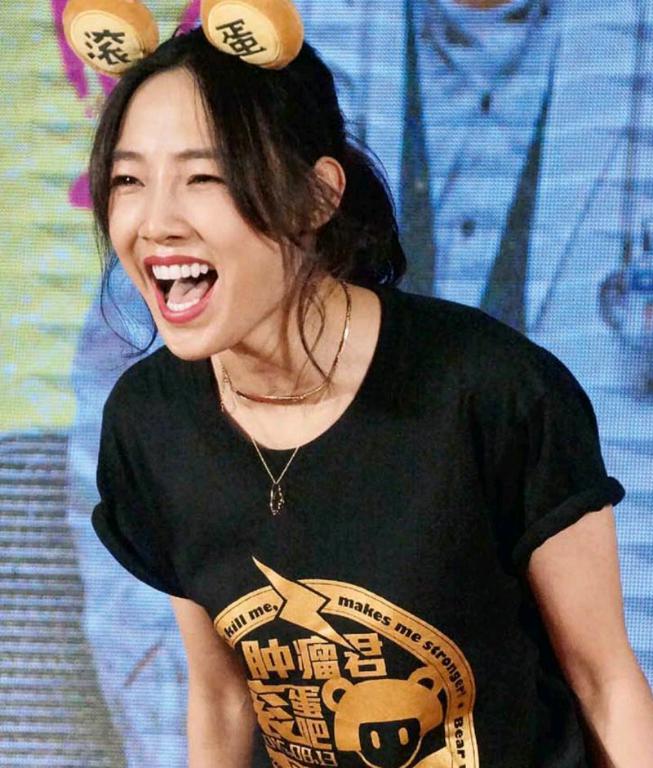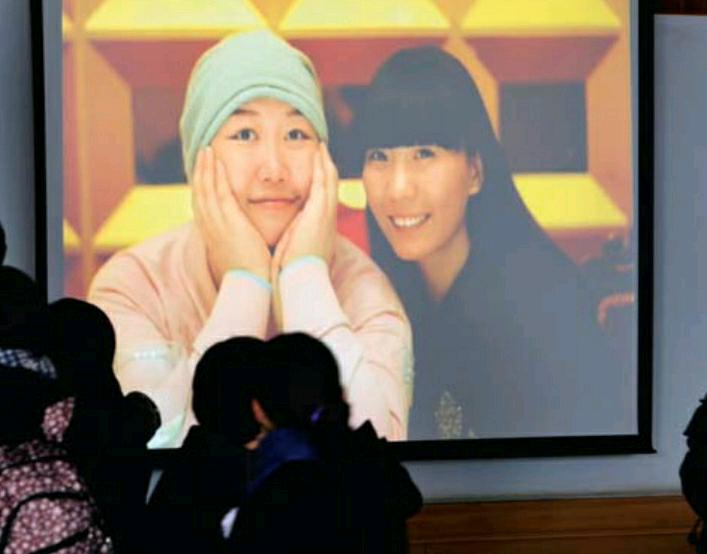Ode to Joy
2015-12-11byZuoShula
by+Zuo+Shula
One of the Oscar nominations for the best foreign-language film officially announced in early October is Go Away, Mr. Tumor! from Chinas mainland. Compared to last year, Chinese audiences have enjoyed more movies worth watching in 2015, and Go Away, Mr. Tumor! is one of them.
Xiong Dun, the leading character, looks just like the angel in Le Fabuleux Destin dAmelie Poulain, in the Chinese version, leaving all twists and turns, including death, out of the question. She reminds the audience of Xing Tian in the ancient Chinese myth, who still fights with his axe even though his head was cut off, watching with his nipples and talking with his navel. In the words of the production crew, she was “born to death.” She turns bitterness into funny stories, building a “Xiong Dun spirit and attitude” marked by optimism.
The creators of the movie, who were bent on making a breakthrough, couldnt care less about the comments they drew such as: “Its a pieced-up story without a theme;” “One thing happens after another;”and “Its a special project of contrived contradictions”…. Because, they know who Xiong is, like the way she is, and were touched by her stories. What they wanted to do was to produce an animation-like movie, a favorite of Xiongs, common in daily life, yet one of a kind.
Some questioned, “Whats your reference point: South Korean, Hollywood, Japanese, or British?” “Nothing. Its a movie about Xiong Dun!” they responded.
Indeed, the animation-based film is a combination of fragmented details of daily life, with broken chapters, incoherent narration, and no transitions. “Animation is composed of quadratic elements,”illustrates Han Yan, the director, “And Xiong Dun was a cartoonist. Id rather depict her way of thinking with pictures than words so as to impress the audience, leading to the release of passion at the final stage.”
It looks loose at the beginning, yet comes together before the end. Its Xiong Duns style, without which it would turn out to be nothing but a story about someone fighting against cancer, a reason that could never win the hearts and minds of so many fans.
Facts of the young movie makers courageous endeavor prove that the ingredients for a film can be cooked in many ways. Most important of all is the outcome of the logic of an open movie maker, who calls the shots on plot and editing. Thoughts arise and develop autonomously. Sometimes these are represented in ways that are completely different, beyond logical deduction. The key point lies in choosing a way which is closer to life.
Its a pity that I would never have a chance in real life to get acquainted with Xiong Dun, who was born in 1982, the same year as my son. Her explosive popularity began with her cartoon, Journal of a Matured Lady, which won her fame as the Chinese Naoko Takagi. Unfortunately, she was diagnosed with cancer in 2011. Nevertheless, she drew the attention of netizens with her journal during her six months in hospital with Go Away, Mr. Tumor!
Xiong Dun died on November 16, 2012, and the film premiered on August 13 this year. “Im the only one who has had close contact with death,” the lady notes on the screen. “Thats why Im authorized to point at and click your life.”
Good films are believed to be realistic, and “absurd realistic” is no exception. In 2012, young movie makers were lucky to see Xiong Dun; they found a lot in common with her such as watching American dramas, loving quadratic elements and cartoons, and communicating via jokes. By then, her condition was deteriorating: She had dropsy, her legs could hardly carry her, and the cancer cells were spreading.
Nobody could guess how much she suffered as she laughed a lot during the recording of A Date with Lu Yu, a popular Chinese television talk show that was aired on Phoenix Television. “Do I look like the monster in Star Wars?” she mocked herself. “And I often forget that Im sick. Im lucky to watch Flesh for Frankenstein in the hospital.”
This was Xiong Dun, who wondered whether she could be duplicated while she saw her flesh coming out after thoracocentesis, who thought herself lucky with tumor rather than leukemia, and who spent time, as much as possible, enjoying the good-looking doctor in charge. This was Xiong Dun: “Everything in front of a dream is an excuse;”“Never too late before its too late.”
She exuded an optimism all her own. To the film makers, Xiong looked no different from other young women born in the 1980s: toiling in a big metropolis day after day, overloaded with work, and breathing smoggy air. She fired her boss when provoked beyond endurance. She expected pleasant surprises from her best friends on her birthday. She felt embarrassed on learning about her boyfriends affair.
“She was a friend to her audience, or one with the audience,” someone commented. “We want to make it familiar and acceptable to the audience.” Xiong was alive during the initial stages of the play. Her book was funny, and self-mocking in tone.
How to put it in a movie? Xiong and the producer had a strong affinity: Both enjoyed daily-life animations about little, funny things. They got on with each other and it came naturally when they agreed to turn her book into a movie on daily life –one of a kind.

The way to make her stories ring true to the audience was to depict the feelings of ordinary people, be non-recreational, and avoid audio and visual elements of blockbusters. It was not about technique, watercooler moments, tumor, life or death. Yet, it was about all of these – about true feelings.
She reminds me of my son, her peer. Like her, others of her age have grown up, but are too young to face death. Are they happy-go-lucky though? Do they have a long way to go?
There was a time when people assumed that those born in the 1980s be- longed to a generation that was “wiseacre, disobedient, non-adaptable, stress-free, irresponsible, and good for nothing except to chase the chimera of joy and freedom.”Or, so it was believed. “They might accomplish nothing and have no future,” it was felt. “What will they do in an environment that doesnt indulge them?” was the worry of many parents.
I feel deeply ashamed in front of Xiong Dun, who has shown me what na?veté is, how big the world is, and the “manhood”that a girl can rise to.
Great things are achieved not by celeb- rities, bigwigs, or important persons, who are usually despicable hypocrites. Rather, they are meant to be accomplished by someone like Xiong Dun, a child-like girl, yet one who acts like a man.
Lost in mixed feelings in the movie hall, I was smiling all the way from the beginning to the end of the story, with no sign of tears or sadness.
What remains etched in mind is Xiongs statement at the end of her life: “Im going ahead of you guys! Ill be waiting there. Fortunately, by the time we meet there, Ill be still younger and prettier!”